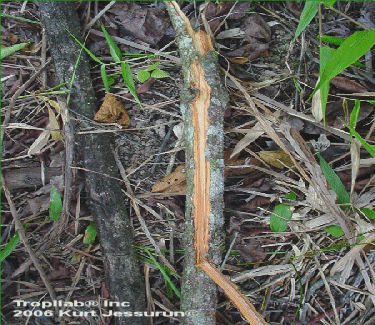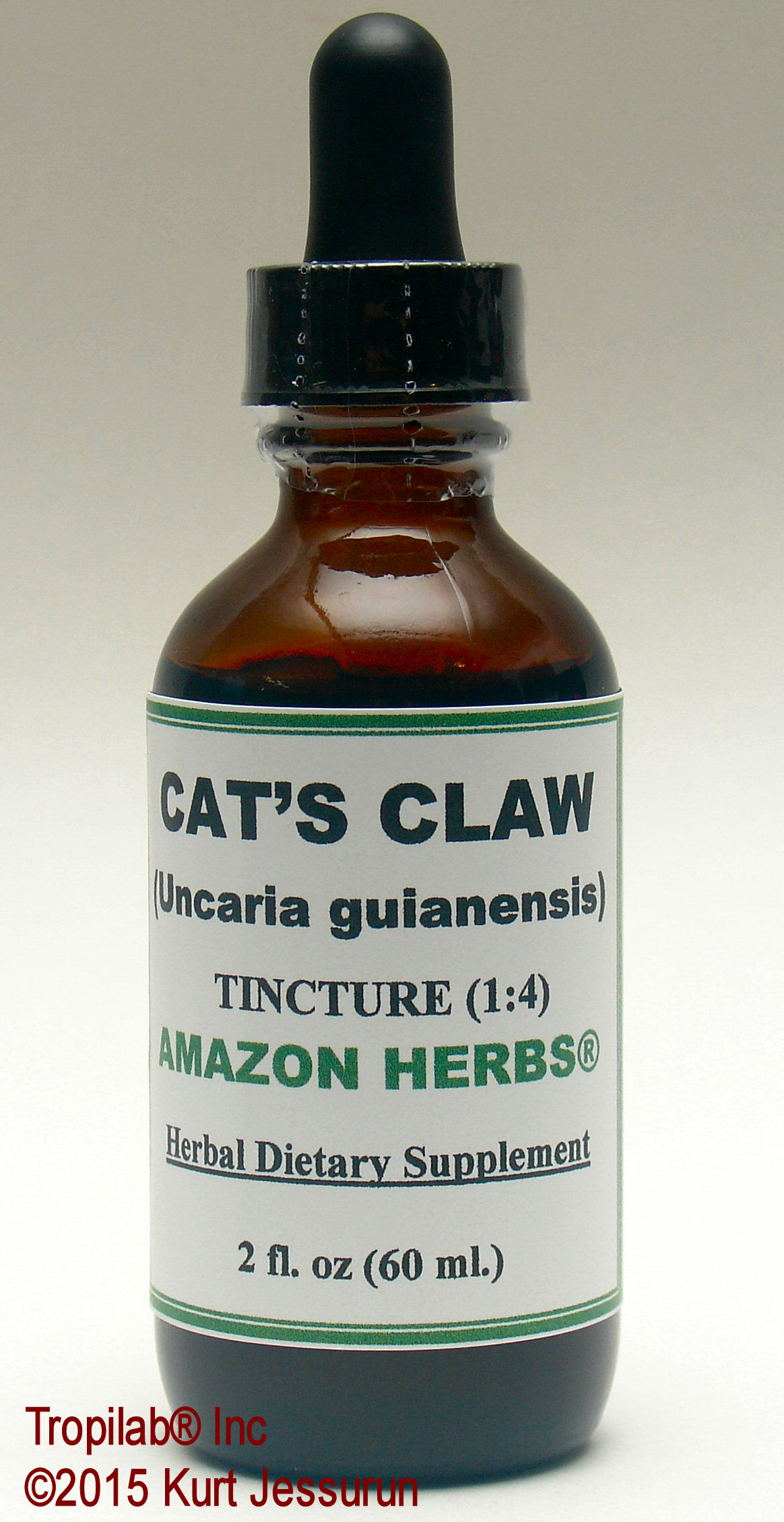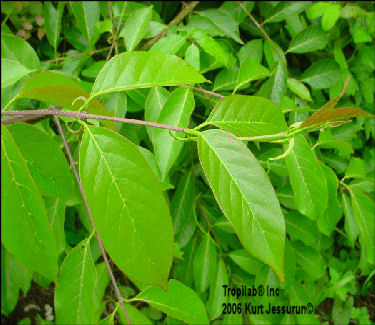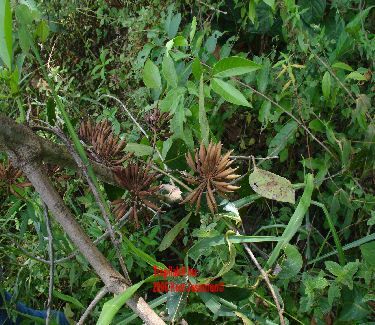 |
 |
| CAT's CLAW TEA (infusio UNCARIA GUIANENSIS) from AMAZON HERBS® |
 Overview
OverviewThe inner bark of Cat's claw or Uña de Gato (named after the hook-like thorns, growing along the woody vine), is used as an immune booster, antioxidant, antiviral and antibacterial agent. We only use the inner-bark for preparations of the tincture and infusion. In Amazon rainforest, this plant is used as a natural remedy for boosting the immune system; to treat- and prevent infection. Cat's claw is one of the most effective natural immune system boosters but is also used as an herbal dietary supplement for gastrointestinal disorders such as ulcers, viral and bacterial infections. Against HIV/AIDS and sinusitis, skin allergies, hemorrhoids, other inflammatory bowel conditions (leaky bowel syndrome), genital- and oral herpes; shingles (herpes zoster), prostatitis, wound healing and rheumatoid arthritis. Even more applications are: against chronic fatigue syndrome (CFS), urinary tract cancer, a certain type of brain cancer (glioblastoma), gonorrhea and dysentery. The best-researched use of Cat's claw is for the relief of arthritis pain and gout. Results from human cases show that taking this herb by mouth (as a tea or tincture) may have anti-inflammatory effects for individuals with either osteoarthritis (the deterioration of joints) or rheumatoid arthritis (an autoimmune disease). Thanks to the antioxidant properties, it may give a weaken immune system the much needed boost, which may benefit people with cancer. For more information about the treatment of gout with Cat's claw, go to the GOUT PAGE. Constituents Quinic acid esters, indole alkaloids (uncarine A - F), alkaloids (rhynchophylline, hirsutine, mitraphylline) triterpenes, tannins, catechins, procyanidins glycosides, flavonoids, plant sterols (beta-sitosterol, stigmasterol, campesterol) and coumarins.  Pharmacology
PharmacologyCat's claw contains many types of plant chemicals that help reduce inflammation (such as tannins and sterols) and fight viruses, (such as quinovic acid glycosides). Cat's claw (especially, due to its glycosides) has proven to inhibit inflammation in various in vivo and in vitro tests.The results validate its history of indigenous use for arthritis and rheumatism, as well as for other types of inflammatory stomach and bowel disorders. It has several groups of plant chemicals that account for the plant's healing properties. Chemicals like the oxidole alkaloids; higher content of pentacyclic oxindole alkaloids (POAs) versus the tetracyclic alkaloids (TOAs), quinovic acid glycosides, antioxidant chemicals (tannins, catechins, and procyanidins) as well as plant sterols (beta-sitosterol, stigmasterol, and campesterol) and carboxyl alkyl esters. Immuno-stimulant properties of some of these chemicals help the body fights off infections and protect against degenerative diseases. Anti-inflammatory and antioxidant activities of Cat's claw (Uncaria tomentosa and Uncaria guianensis) are independent of their alkaloid content. Both species of cat's claw provide effective antioxidant and anti-inflammatory activities. However U. guianensis is more potent. In conclusion, the presence of oxindole or pentacyclic alkaloids did not influence the antioxidant and anti-inflammatory properties of cat's claw. Cat's claw has also been used with Zidovudine (AZT) to treat HIV. Various phytochemicals that Cat's claw contains are known to promote loss of water from the body, relax smooth muscles, and widen small blood vessels in the hands and feet. All these effects may help to lower blood pressure. Cat's claw is being studied for many other possible uses among others, Crohn's disease, multiple sclerosis, systemic lupus erythematosus (SLE or lupus), Hepatitis and Alzheimer's disease. For more information on Cat's claw, go to the "Cat's claw plant" page.  Dosage
DosageTincture: 1 -3 ml, 2 -3 times per day. Infusion (herbal tea): 1 or 2 teaspoons of dried herb per cup of hot water; use up to 3 cups a day. Warning /Interaction  Since Cat's claw stimulates the immune system, this herb should not be used with medications intended to suppress
the immune system, such as Cyclosporin® or other medications prescribed following an organ transplant.
Since Cat's claw stimulates the immune system, this herb should not be used with medications intended to suppress
the immune system, such as Cyclosporin® or other medications prescribed following an organ transplant.Do not take if you are pregnant, considering pregnancy or breast-feeding. Do not take with the diabetes drug Glipizide®. Use with caution when taking hormones; it may affect levels of the female sex hormones. Reference Cat's claw vs. placebo in rheumatoid arthritis. Castaneda O, Leon G, Leon D, et al. Paper presented at Symposium on Uncarias, Lima, Peru, 1997. Two new nor-triterpene glycosides from peruvian "Una de Gato" (Uncaria tomentosa). Kitajima M, Hashimoto K, Yokoya M, et al. J Nat Prod 2003;66(2):320-323. Randomized double blind trial of an extract from the pentacyclic alkaloid-chemotype of uncaria tomentosa for the treatment of rheumatoid arthritis. Mur E, Hartig F, Eibl G, Schirmer M. J Rheumatol 2002;Apr, 29(4):678-681. Efficacy and safety of freeze-dried cat's claw in osteoarthritis of the knee: mechanisms of action of the species Uncaria guianensis. Piscoya J, Rodriguez Z, Bustamante SA, et al. Inflamm Res 2001;50(9):442-448. Double blind clinical test comparing Uncaria guianesis against placebo in single daily dosage to treat knee osteoarthritis. Silva H, Diaz R, Segami I. Paper presented at Symposium on Uncarias, Lima, Peru, 1997. Pharmacological evidence for antidementia effect of Choto-san (Gouteng-san), a traditional Kampo medicine. Watanabe H, Zhao Q, Matsumoto K, et al. Pharmacol Biochem Behav 2003;75(3):635-643 Cat's claw: an Amazonian vine decreases inflammation in osteoarthritis. Hardin SR. Complement Ther Clin Pract. 2007 Feb;13(1):25-8. Uncaria tomentosa (Willd.) Dethnomedicinal use and new pharmacological, toxicological and botanical results. Keplinger K, Laus G, Wurm M, et al. J Ethnopharmacol. 1999;64:23-34. Toxicological aspects of the South American herbs cat's claw (Uncaria tomentosa) and Maca (Lepidium meyenii): a critical synopsis. Valerio LG Jr, Gonzales GF. Toxicol Rev 2005;24(1):11-35. Cat's claw: an Amazonian vine decreases inflammation in osteoarthritis. Hardin SR. Complement Ther Clin Pract. 2007 Feb;13(1):25-8. Uncaria tomentosa (Willd.) Dethnomedicinal use and new pharmacological, toxicological and botanical results. Keplinger K, Laus G, Wurm M, et al. J Ethnopharmacol. 1999;64:23-34. Toxicological aspects of the South American herbs cat's claw (Uncaria tomentosa) and Maca (Lepidium meyenii): a critical synopsis. Valerio LG Jr, Gonzales GF. Toxicol Rev 2005;24(1):11-35. The above presentation is for informational and educational purposes only. It is based on scientific studies (human, animal, or in vitro), clinical experience, or traditional usage. For many of the conditions discussed, treatment with prescribed (RX) or over - the - counter (OTC) medication is also available. Consult your doctor, practitioner, and/or pharmacist for any health problem and before using dietary supplements or before making any changes in prescribed medications. |
For the right freight rate, shipping charges, conditions and delivery service, please visit our Webstore page! |
TROPILAB® INC |